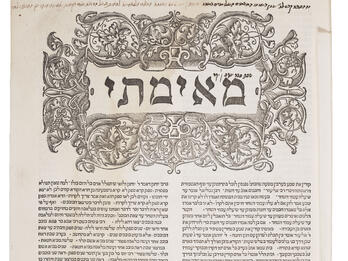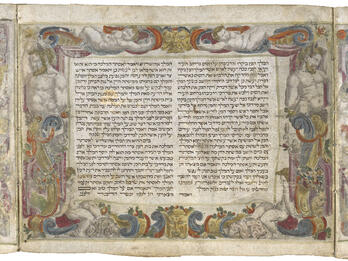Sefer ha-zikuk (The Book of Expurgation)
This is the Book of Expurgation which I composed in Mantua and which I completed on the 1st of August, 1596, in the name of God.
1. Whenever the term idolaters appears, and it is not clearly referring to the idolatry of ancient times, it shall be replaced with the phrase akum, which means “worshipers of stars and constellations.” However, if it is plainly referring to idolatry that existed before the coming of our Lord, then there is no problem.
2. Regarding any mention of “molten images” and the like, the phrase “of akum” shall be inserted alongside it.
3. With regard to any mention of “a gentile” or “gentiles” or “foreign man” or “foreign woman,” if the context indicates any disgrace, shame, or defect in that gentile, then it shall be erased and replaced with akum.
However, if it is dealing with one of the laws of the Hebrews, such as the laws of the Sabbath, forbidden foods, or wine that was touched by a gentile, and the like, then there is no problem.
4. Yet the above exception applies only if no idolatry is mentioned, such as “the intention of the gentile is for idolatry,” or “a gentile certainly pours out libations to idolatry,” and similar examples, in which case it must be entirely erased.
5. All mentions of “heretic” and “heretics” shall be entirely erased.
6. Any mention of “apostate,” if not meant derogatorily, shall not be erased but shall be replaced with akum, but if it has a derogatory connotation then it shall be entirely erased.
7. Regarding any mention of “nation” or “nations,” the term akum shall be written alongside it.
8. However, if it is understood that this is a general name for all the nations of the world in the current day, or that it refers specifically to our [Christian] nation in this generation, then the whole passage shall be erased, as it is worse to edit it to akum.
9. With regard to any praise of the Israelite nation, which implicitly discredits us [Christians], and which would be understood as referring to our times, the whole passage shall be entirely erased.
10. Whenever the uncircumcised state is censured, it must be specified that this is referring to times past. For example, the phrase “the uncircumcised state is repulsive” shall be replaced with “the uncircumcised state was repulsive.”
11. Regarding any place in the Bible where there is a dispute between our [Christian] faith and theirs, if any difficulty is explicitly raised against our opinion, or if a proof is cited for their view, then the whole passage shall be entirely erased, even if the name of Christians and their scholars are not expressly mentioned. However, if the matter is explained in accordance with their opinion, while no difficulty is raised against ours, then there is no problem.
12. Whenever a passage condemns any of the laws of our belief or of our Bible, or any of our customs, or if a king or priest or bishop from our holy priesthood is disparaged, then the whole passage shall be entirely erased.
13. Whenever some idea is stated that is entirely heretical and a grave error, such as the notion of reincarnation or that all souls were formed in the six days of creation, or that the Holy One, blessed be He, weeps, or that the souls of the wicked are harmful spirits and demons, or that the evil spirits that enter people’s bodies are the souls of the wicked who have already died, and other similar examples—the entire passage shall be erased.
14. Regarding any place where the name Edom, Rome, or Italy is mentioned in a derogatory manner, it shall be erased.
15. Regarding any place where it states that the Holy One, blessed be He, is sorrowful over the loss of Israel, it shall be entirely erased.
16. Wherever it mentions the case of those few of them who died for their faith, as occurred to several of them who passed away in Portugal and Spain, if it states there that they thereby sanctified God, or if it refers to them as righteous or saints, it shall be entirely erased.
17. Wherever it mentions our festivals, appointed times, and holidays in a derogatory fashion, such as “before their festivals etc.” [see m. Avodah Zarah 2:1], or if it states that it is prohibited for Jews to engage in business with them on those days, it shall be entirely erased.
18. It is also necessary to erase the name of the festival if they mention it explicitly, such as Kalenda, Saturnalia, and the like [see b. Avodah Zarah 6a].
19. Whenever there is a mention of the name of priests, bishops, officers, dukes, or popes, if it is not clearly referring to individuals who lived before the coming of our Lord, it shall be entirely erased.
20. Whenever it labels any one of them who lived after the coming of our Lord as holy and righteous, or if it calls a congregation “holy congregation” or “assembly of God,” this shall all be erased.
Concerning all these cases, much study is required, with the aid of insight and knowledge, especially when the name of idolatry is mentioned.
I pray to God, that the Father, Son, and Holy Ghost will assist me in my zealous defense of the belief in Jesus, our brave Messiah. May he enlighten the eyes of the people who walk in darkness—the people of the children of Israel—so that they will see the good path, the path of eternal life, the path of our Lord, Jesus, the Messiah of God.
Credits
Published in: The Posen Library of Jewish Culture and Civilization, vol. 5.







